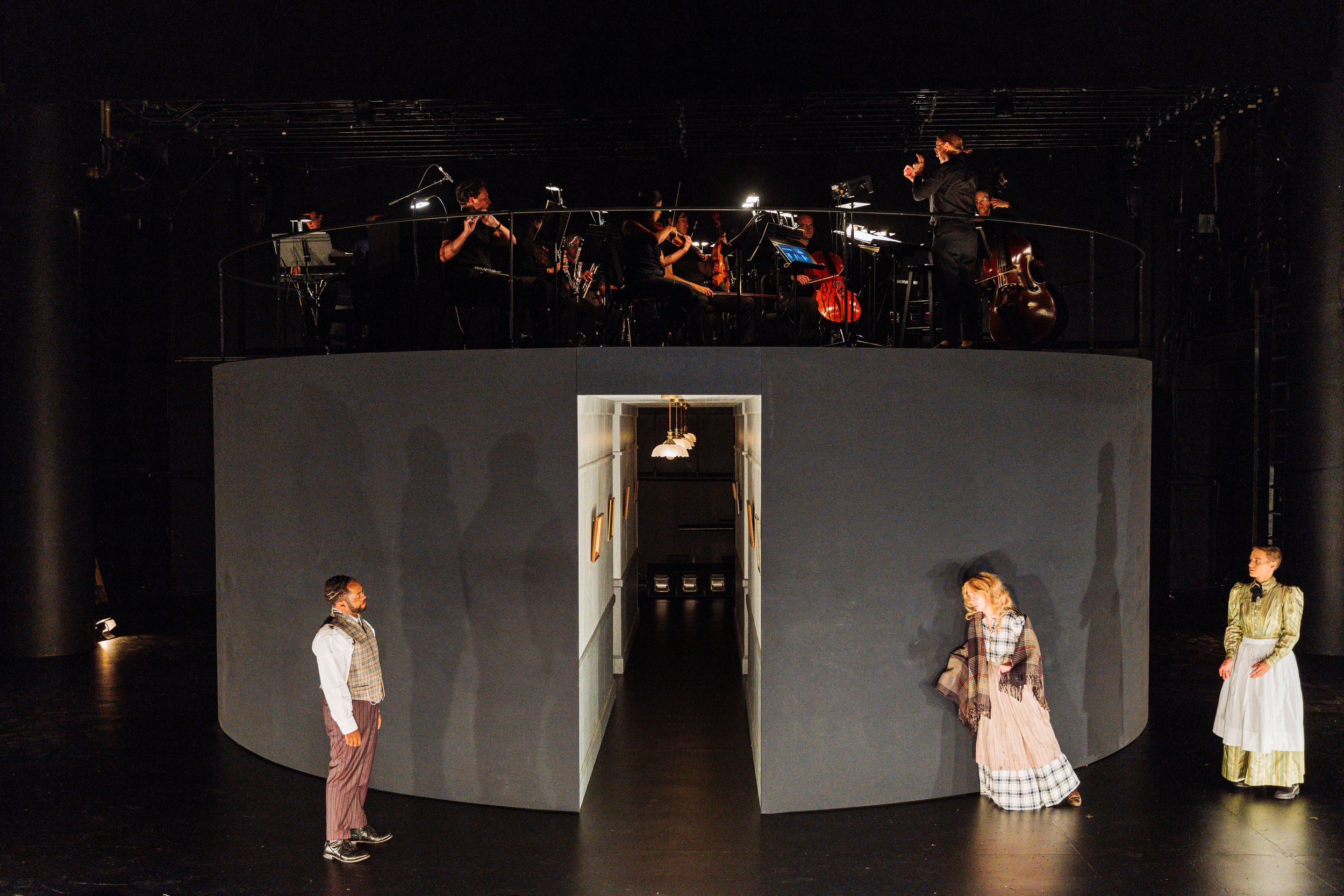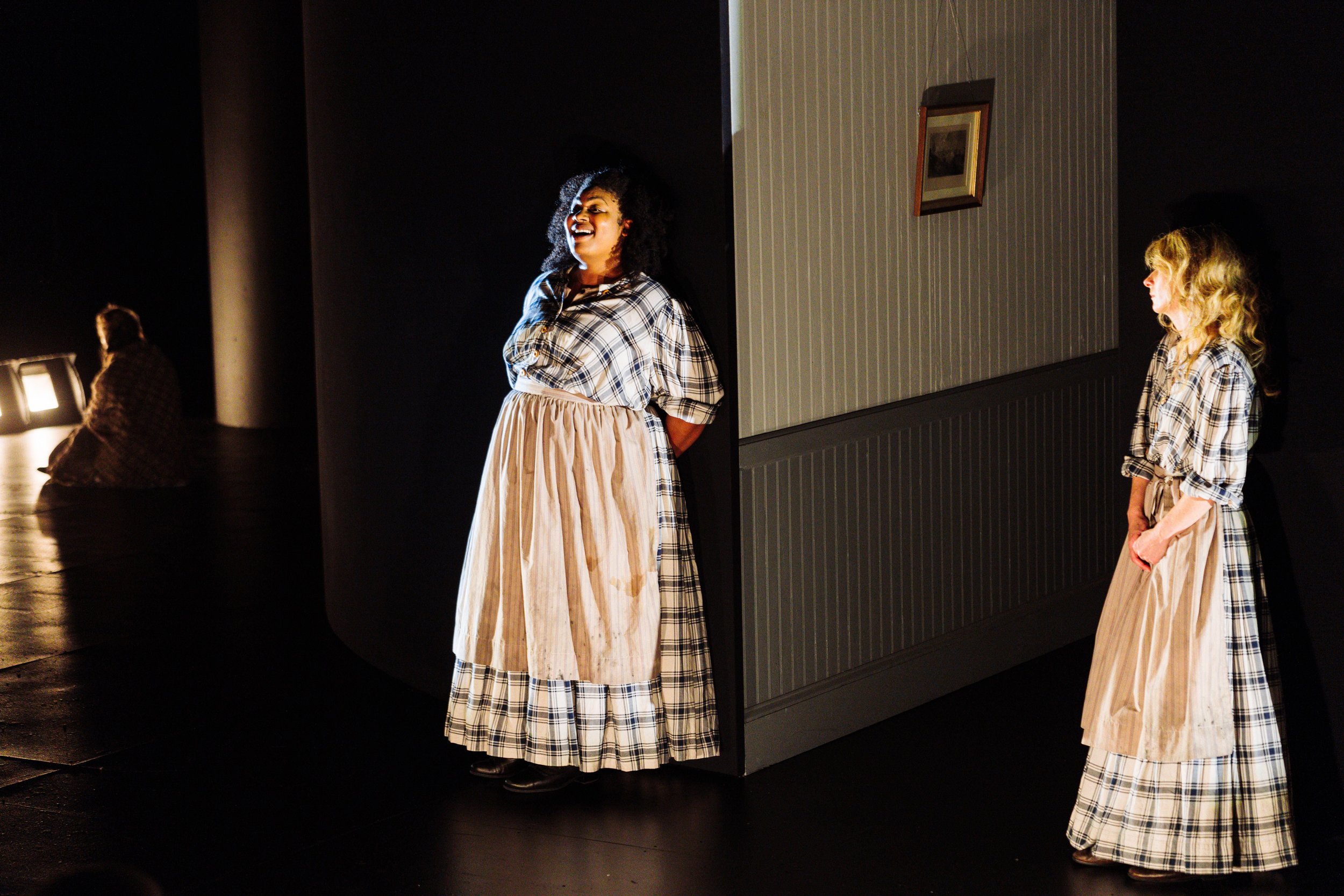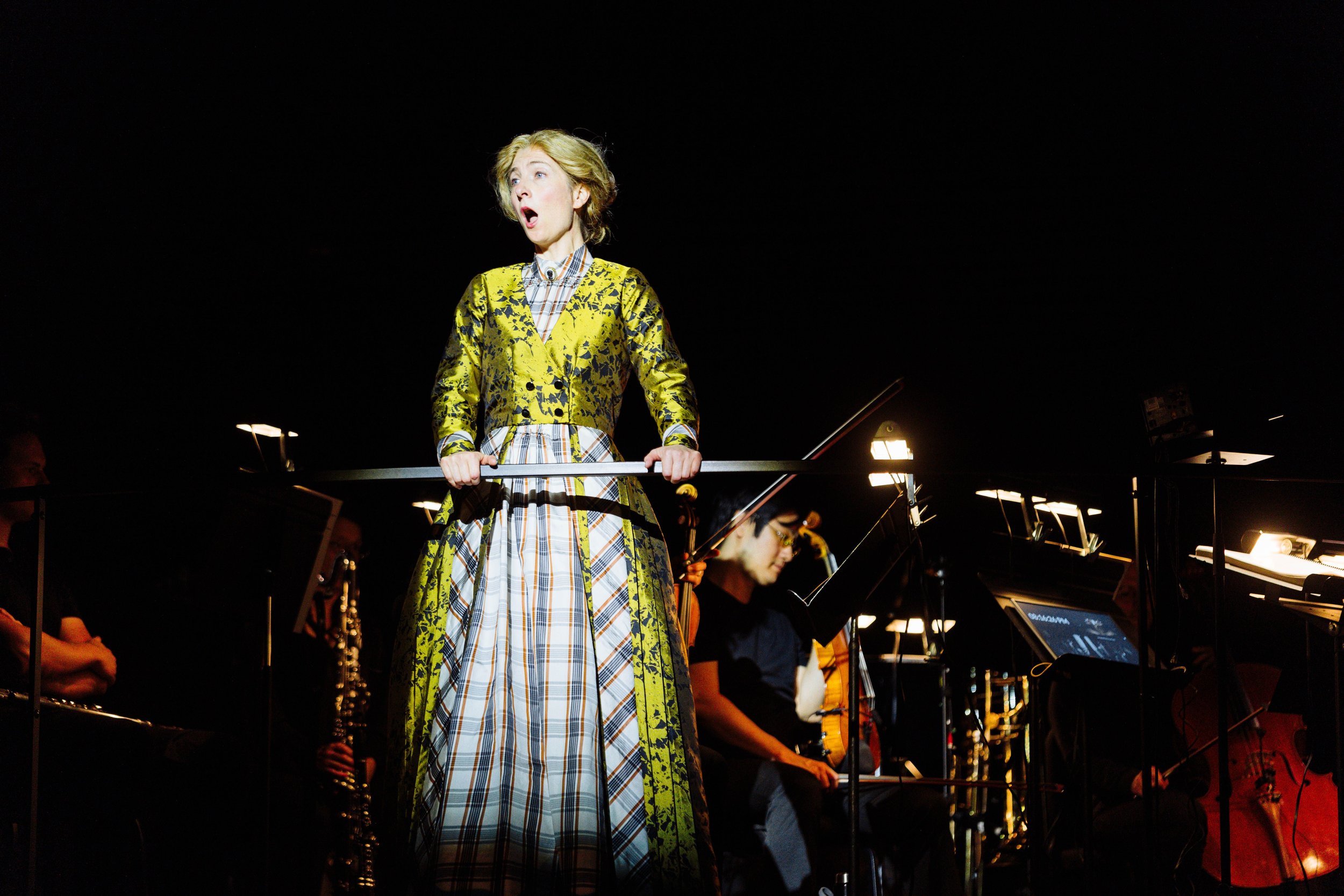Opera Philadelphia opened its Festival O23 the way you should, with a showpiece, and what better showpiece than a world premiere of a new work. Such was the case in putting forward composer Rene Orth’s and librettist Hannah Moscovitch’s chamber opera, 10 Days in a Madhouse, the telling of investigative reporter Nellie Bly’s experience via an emotionally immersive musical drama. Madhouse’s all-female creative team communicates the wrongful internment and cruel mistreatment of women in Blackwell’s Asylum in the 1880s, and the societal issues underpinning those misdeeds, with a plea to end the continuing saga; remnants remain today, even in current times.
Real life Elizabeth Jane Cochran, famously known later by the pen name Nellie Bly, was a female reporter who needed work, difficult to come by for female reporters back then. She accepted a daring assignment no man could accomplish. She feigned mental illness to get herself committed to Black’s asylum in 1887 to expose conditions there. She wrote about it afterwards in articles and a book, from which the opera’s name is taken. Her work on this assignment had a significant impact by increasing public awareness that led to improved conditions.
A view of the set and orchestra placement for 10 Days in a Madhouse, with, l to r, Will Liverman as Dr. Blackwell, Kiera Duffy as Nellie Bly, and Lauren Pearl as the Nurse. Photo by Dominic M. Mercier; courtesy of Opera Philadelphia.
The opera begins in the asylum, known then as the Women’s Lunatic Asylum on New York’s Blackwell Island, now named Roosevelt Island; the stigmatizing name speaks to societal attitudes of that period. It is day 10 of Nellie’s stay in the asylum. She wants out of the asylum, but her pleas are ignored by Dr. Blackwell; he asks if she is still hearing voices. Director Joanna Settle will take us back in time over the next 90 minutes, stopping in a few different days to see Nellie’s condition and the treatment of her fellow inmates. Those stops offer views of a fellow inmate Nellie befriends, Lizzie, who is grieving over a lost daughter. Lizzie is distraught with mourning but has been led to believe she is “mad”. We learn but little of Dr. Blackwell; his wife has died, and he treats female patients with waltzes as therapy. We meet other patients, some there due to mental illness, some misdiagnosed and some simply cast off and powerless. We meet a nurse who shepherds the inmates, and we learn of the brutal treatment from the nurses and the lack of adequate heat and food. The plot is loosely based on the real story; except for Nellie, the characters are creations of the composer and librettist.
Raehann Bryce-Davis as Lizzie and Kiera Duffy as Nellie Bly. Photo by Dominic M. Mercier; courtesy of Opera Philadelphia.
The story telling is enhanced by Andrew Lieberman’s set and lighting design. We see only the stark exterior wall of a circular building and glimpses of a center door and hallway. Costumes by Asta Hostetter and Avery Reed seemed appropriate for the date and setting. The Wilma Theater is smallish which works well for such an intimate drama. Director Settle kept the action moving as it drifted back in time. This theatrical element of reversing time may have engaged the audience more, but such a powerful story would be effective either way. Sometimes the characterizations were a bit baffling, and some of the poignant interactions among the patients might have benefited by further development to develop more empathy for their characters, but the points overall were well made.
Lauren Pearl as the Nurse in the foreground controlling a group of patients. Photo by Dominic M. Mercier; courtesy of Opera Philadelphia.
The chamber-sized orchestra was seated atop the stage, which seemed logical though at times a bit distracting. Composer Orth’s music included a mixture of genres, a style she is known for; in this case, chamber music represented reality and electronic represented insanity, entirely reasonable (both true and a joke). It was a bit crazy-making to hear melodic themes appear and then be replaced or overridden by disturbing electronic music recordings. The vocals were mostly intense, shrill really, and worked to convey the story. Composer Orth’s music was performed well as led by Conductor Daniela Candillari, and it must have been a challenging assignment, given the nature of the music and the lack of line of sight to the singers. I enjoyed the music as an integral part of the whole work, a work I liked and found affecting. I’m not sure I’d want to sit down and listen to it with a glass of wine in the evening. But maybe…I’ll give it a try if it becomes available. I recommend it, though I’m not sure I want to see the opera again. Ninety minutes in a madhouse is quite enough, thank you.
Will Liverman as Dr. Blackwell and Kiera Duffy as Nellie Bly. Photo by Dominic M. Mercier; courtesy of Opera Philadelphia.
As is often the case, Opera Philadelphia hedges its bets by casting their operas with top notch singers. Frankly, if it is redone with soprano Kiera Duffy, mezzo-soprano Raehann Bryce-Davis, and baritone Will Liverman I might go see it again. It was a treat to see Ms. Duffy perform with OP once more since she was so impressive in the premiere of Breaking the Waves a few years back. Not only was her singing exceptional once again, but her acting was impressively controlled; she owned the stage, seeming a bit deranged by her experience at day 10 and appearing pleased with herself for fooling them on day one. Mr. Liverman has become a hot ticket, winning many awards and appearing on the best opera stages. His baritone voice and singing was enjoyable to hear again. His Dr. Blackwell was likable, a seemingly sympathetic physician, but a bit creepy, one whose motives you would not trust. A tender scene was provided by Ms. Bryce-Davis as Lizzie; her vocal fireworks and pathos over the loss of her daughter, her only child, ripped my heart out and will yours. Soprano Lauren Pearl seemed an unsympathetic controlling nurse who also performed a dramatic dance number, contributing to the unsettling atmosphere. The principals were supported by a nine-member female chorus led by Chorus Master Elizabeth Braden.
Kiera Duffy as Nellie Bly reporting the results of her expose. Photo by Dominic M. Mercier; courtesy of Opera Philadelphia.
My one disappointment with the production was that I had hoped to have the opera be more about Nellie Bly. I agree with composer Orth that this story of the madhouses needed to be told as an opera, but there is more to Bly’s story that could be artfully mined by opera. Ms. Bly raised the bar for investigative reporting, and she seems to have been a remarkable person and a trailblazer for improving opportunities for women..
The many problems associated with the diagnosis and health care of mental illness are being reported in the mainstream news now. However, in addition to its value as an artistic work, 10 Days in a Madhouse, serves to remind us that these problems have gone on too long. The closing scene has Nellie Bly giving a talk on her experiences and the conditions in the asylum. She closes with “Make it stop…please”.
The Fan Experience: 10 Days in a Madhouse was scheduled for performances on September 21, 23, 26, 28, and 30. The opera is sung in English with English translations projected on side monitors. Information and tickets can be accessed at this link.
Opera Philadelphia has placed a helpful, short video on Youtube giving an overview of the opera and its history by scholar in residence, Lily Kass. Ms. Kass notes that in 19th century America, the people with the power to arbitrate sanity were almost exclusively men; one wonders what it is today. The video is less than eight minutes and well worth viewing.
Festival O23 continues through October 1. The two-week program, which also includes performances of Simon Boccanegra and Unholy Wars as well as many concerts and recitals. can be viewed in its entirety at this link. I might also add that Philadelphia remains one of my favorite places to visit, offering so much in history, culture, entertainment, and great food!





